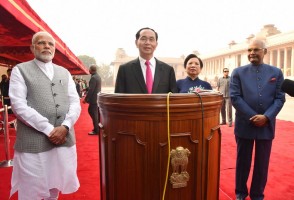
FDI reforms to boost employment, ease of doing biz
Deepak Kumar
As the government envisions to attract more foreign investments, generate employment and facilitate further the ease of doing business in the country with its latest FDI liberalisation announcements, several national and international analysts said this expanded scope of FDI reforms would stimulate foreign investments in India, thereby giving a fillip to Prime Minister Narendra Modi-led Make in India scheme.
The government on Monday announced major changes in India’s foreign direct investment rules, allowing 100% foreign investments in defence and airline business, and relaxing norms for single-brand retails and keeping most sectors on automatic approval route.
Praising the government’s new initiative, KPMG Partner & Head (Tax) Girish Vanvari said, “Coming at the back of the draft GST bill last week, the government’s move to ease the FDI regime is well-timed and sends out a signal of confidence in the Indian economy. The liberalisation of limits in defence, brownfield pharma, airports, private security services, food processing can be a game changer and be a huge source of employment generation.”
The US-India Business Council (USIBC), too, applauded the government’s FDI liberlisation measures and said the expanded scope of FDI rules in broadcasting services, civil aviation, defense and pharmaceuticals will give an impetus to the potential of the US-India bilateral trade.
Speaking on the liberalisation of FDI, Mukesh Aghi, President of the U.S.-India Business Council said, “we applaud the liberalisation of FDI to 74% in brownfield investments under the automatic route in the pharmaceutical sector, while also allowing investments beyond 74% and up to 100% through government approval. Allowing up to 74% through the automatic route will encourage investment to move swiftly into India. These reforms include accelerated infrastructure investment, greater openness to foreign direct investment, less red tape, and a revised bankruptcy code. We had stated earlier that $45 billion is only a starting point for American companies to invest in India. With these newly announced reforms, FDIs, technology transfers, and jobs are likely to increase substantially.”
ASSOCHAM President Sunil Kanoria said the relaxed FDI norms would help India realise its dream of self-reliance in the defence sector, which has tremendous possibilities for attracting investments, generating high skilled employment, obtaining technologies and capabilities and setting up manufacturing facilities.
“It will also help in bringing investment and advanced technology into the defence sector thereby leading to inflow of capital and setting up entities of original equipment manufacturers (OEMs) and their suppliers through transfer of technology. Increasing the FDI limit will also facilitate better compliance of offset obligations,” he remarked. Speaking on the impact FDI will have on the pharma industry, Kanoria said, the pharma industry will also be a major beneficiary in terms of acquiring more capital/funds for investments in R&D, which will lead to creation of more intellectual property rights (IPRs).
Sagar Pawar, Executive Director (Pharma), PwC, told The Dollar Business “It is definitely a great development. The FDI will enable more companies to come into the Indian market which will enhance competition, thereby setting a quality standard in the industry. The government has already put in place mechanism for R&D and pricing, and impact of this development. So, we don’t see any negative impact of the new FDI norms. Though there could be some differences in drugs pricing, it won’t be much. Foreign companies will need to comply with the demands of the Indian industry. Overall it will create a healthy environment for the domestic pharma industry,” he said.





 to success.
to success.